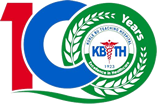The Ghana Institute of Clinical Genetics of the Korle-Bu Teaching Hospital has disclosed that globally, about 95% of children born with sickle cell disease survive to adulthood.
The institute said, this is possible because of improved comprehensive care and management of the condition.
Dr. William Ghunney, a Senior Specialist said this on behalf of the institute at this year’s World Sickle Cell Day celebration in Korle-Bu with the theme “Improving Sickle Cell Disease Care for All”.
He said the mortality rate amongst children born with sickle cell disease if not treated was very high, but the situation he said has significantly changed with the rate of children surviving from childhood to adulthood being very high. He added that, there is increasing life expectancy among children born with the disease.
According to Dr. Ghunney, over 300,000 babies are born with sickle cell anaemia annually world-wide and 80% are born in sub-sahara Africa. “Most patients with sickle cell disease die during childhood if not diagnosed early. To improve care of sickle cell disease, we should get tested, know our status and stop stigmatization,” the Senior Specialist advised.
The Director of the Institute, Dr. Amma Benneh- Akwasi Kuma, commended non-governmental organizations, Corporate Ghana, partners, and donors for their continuous support towards the provision of quality healthcare to patients living with sickle cell disease.
She mentioned that the institute as part of its plans would want to upgrade the current facilities, infrastructure and equipment in order to improve care delivery to patients. She thus urged support in cash and kind from individuals and organizations to do this.
Dr. Eugenia Vicky Asare mentioned that there are approximately 10,000 sickle cell patient visits , with 3,000 patients being attended to every year. She said the institute currently has 13 beds which comprises 8 female and 5 male beds. Dr. Eugenia revealed that the oldest patient in the institute that is living with sickle cell disease is more than a 100 years old.
The Head of Department for Polyclinic/Family Medicine, Dr. Priscilla Vandyck-Sey, in a solidarity message, noted that management of patients becomes difficult when patients are unable to pay for clinical services including blood transfusion processes. The delays, she said, affects clinical decision-making, especially in blood transfusion.
She advised that in future celebrations, the Institute should consider collaborating with the Society of Family Physicians of Ghana in order that the advocacy is given the needed mileage.
Dr. Vandyck-Sey noted that as a country, new born screening should be taken seriously, so that the complications that come with it would be reduced to the barest minimum.
Madam Emilia Dabbo of Obstetrics & Gynaecology Department on her part, applauded the collaborative efforts between the institute and the Obstetrics unit in Korle-Bu and advised that pregnant women with sickle cell disease should be provided with mosquito nets, nutritious meals and be made to attend the department’s pregnancy school.
An 81 years old patient, Madam Rebecca Adjin Tettey, in her testimony reveals that she has been living with sickle cell disease. She started her medical care at the medical unit in Korle-Bu when she was younger, but when she defaulted she presented to the Korle-Bu Polyclinic where she was referred to the sickle cell clinic. She has been taking all her medication as prescribed and listening to the good counsel by the healthcare providers; as a result, she’s living a healthy life with an improved quality of life.
A young adult patient by the name, Dr. Enam Bankas, also testifies to being a patient living with sickle cell disease and has battled with the condition over the years and still counting at the Korle Bu Teaching Hospital.
#kbth #ExcellenceInHealthcare #clinicalgenetics








